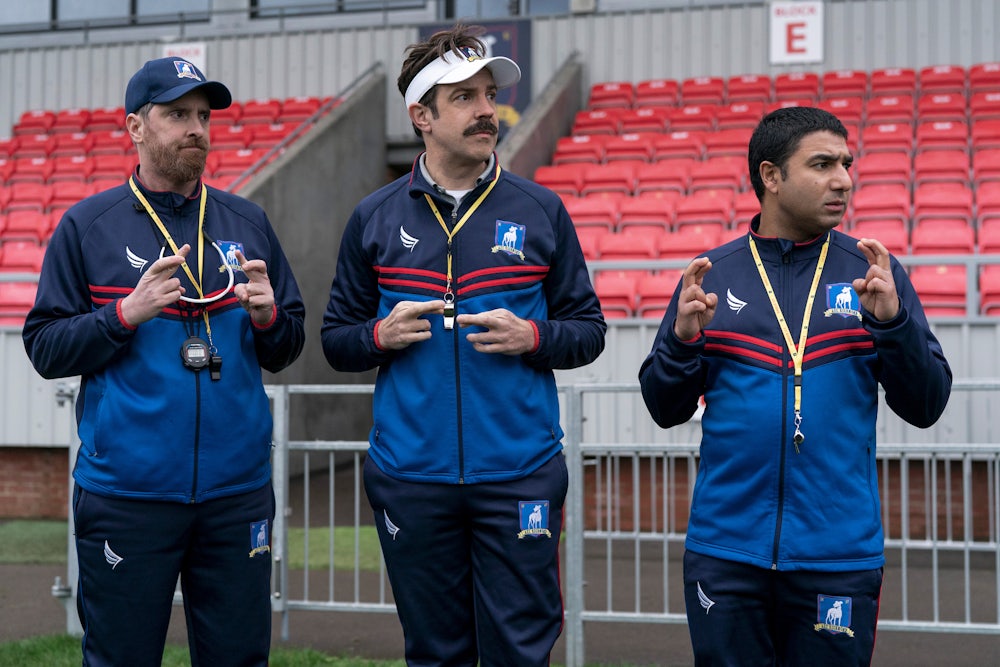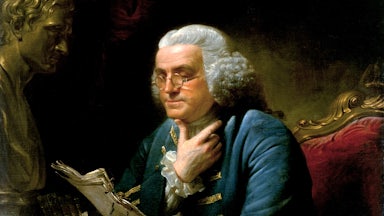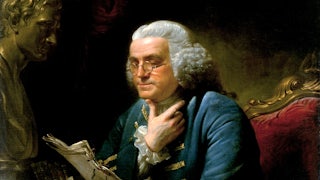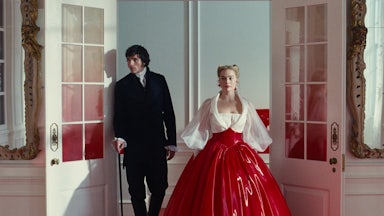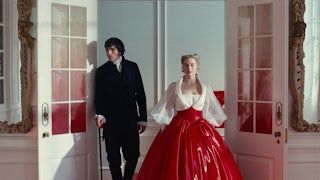The first season of Ted Lasso, Apple TV’s streaming series about an American college football coach (Jason Sudeikis) who takes over a top-flight English soccer team, was blessed with perfect timing. It debuted in August last year, and Lasso’s relentless optimism in the face of every crisis was a balm amid the grinding anxiety of the Covid-19 pandemic and the presidential election. The title character was, moreover, a reminder that deep down there might be something redeemable about America—a conclusion far from obvious for much of the country in the Trump era. Once, English people taught Americans how to self-actualize—think Mary Poppins or Batman’s Alfred. Lasso, a transplant with no knowledge of soccer whatsoever, taught pompous and cynical Brits how to believe.
The result was both a word-of-mouth hit and, more surprisingly, a critical darling. Few faulted Lasso for its light touch—a show without any real conflict, in which Lasso, despite his lack of knowledge or experience, ascends almost effortlessly. Last month, the show garnered 20 Emmy nominations, the most for a new series in television history. There is little sign of a backlash: The show’s second season, which started streaming on Friday, has a 100 percent fresh rating on Rotten Tomatoes. But the new season of Ted Lasso is also appearing in a different context: Last year’s angst is still present, but more muted. The question is whether it can give depth to its paper-thin characters without losing the sunniness that made it a runaway success.
Very little about the series makes sense on paper. It is a sports sitcom that rarely shows its team in action; the first season barely featured a handful of games, nearly all of which were grace notes or footnotes to the main action. It is, moreover, a show rooted in English soccer that is aimed squarely at Americans; it features as many references to the NBA as it does to the English Premier League. It is also a comedy that is not particularly funny. Ice cream, per Lasso, is “like seeing Billy Joel live—it never disappoints,” while “you beating yourself up is like Woody Allen playing the clarinet. I don’t want to hear it.” The television character that Lasso most closely resembles is Ned Flanders, the hyperoptimistic neighbor in The Simpsons. (Flanders is funnier, if only because we laugh at his expense.)
Most strangely, Ted Lasso is a show about the value of sincerity and integrity, but it began as a TV commercial: Sudeikis’s character first appeared in promos for NBC’s Premier League coverage in 2013. Not much has changed. Ted is still an American college football coach who has been given control of a Premier League team without any knowledge of the sport. Season one kept this premise but gave it an explanation straight out of Major League: Lasso’s appointment was an act of sabotage. The owner of the soccer team in question, AFC Richmond, was trying to get the team relegated—that is, demoted to the second level of English soccer, as three Premier League teams are every season—as revenge against her ex-husband, its former owner. The show also does little to disguise the fact that it is a display case for the products of its benefactor. Many of Ted Lasso’s sets may as well be Apple Stores: There are iPads and iPhones everywhere. (They have something else in common: too much Marcus Mumford.)
Lasso’s first season was redeemed, in part, by the quality of its cast. Sudeikis’s performance adds humanity to a character who otherwise behaves like a sentient motivational poster. Lasso should be grating, not just to the pampered millionaires whom he has improbably been assigned to manage, but to the audience as well. But Sudeikis gives Lasso a melancholic core, making his insistence on seeing the brighter side of things seem hard won rather than naïve. The supporting cast is made up of similarly one-note characters imbued with depth by outstanding performances: a gruff college football assistant coach with a heart of gold (co-creator Brendan Hunt); a classic soccer WAG who proves to have more depth than you’d expect (Juno Temple). Veteran midfielder Roy Kent is clearly modeled on the gruff, hard-charging Manchester United legend Roy Keane but is given a gooey core by Brett Goldstein, who is also a writer on the show. Some characters remain one-note even in the show’s second season, particularly the hyperpositive (even by the standards of Ted Lasso) Danny Rojas.
The second season of Lasso begins by attempting to broaden its scope beyond the buoyancy of its first. AFC Richmond has been relegated to England’s cutthroat and relentless second division, the EFL Championship. Promotion back to the Premier League, which comes with tens of millions, is a necessity but a challenge: Richmond starts the season with eight straight ties. At the same time, the show’s characters are all undergoing various tests. Kent has retired and is trying to figure out who he is without the sport that has defined his entire life. Nate, a gifted tactician who was promoted from kit man to assistant coach last season, struggles to control his ego. Richmond owner Rebecca Welton navigates the online dating world after a messy divorce.
Fictional depictions of sports typically thrive on villains and conflict—like The Judge in The Natural or communism in Rocky IV—but Ted Lasso largely eschews both. Welton seemed like villain material at the start of season one, when she hired Lasso to destroy the team her philandering ex-husband loves, but her iciness was quickly melted by Lasso’s charms. Jamie Tartt, the egotistical wunderkind striker who clashed with Lasso in the first season, hardly qualifies as an antagonist. (Tartt, in the show’s second season, is competing in Lust Conquers All, a fictional take on the saucy British reality show Love Island.) Both characters can be cruel but are treated with sympathy: Their flaws are portrayed as the result of being hurt by people they loved.
Ted Lasso is ultimately much less about triumphing over a hated rival than it is about improving oneself. (A major subplot of the show’s second season revolves around therapy.) At its best, these parts of the show present a critique of masculinity rarely present in sports; at worst, they resemble Instagram posts about self-care. Still, as with the first season, the second has a way of winning you over, as Lasso himself seems to do with even the hardest-hearted of Brits. Sometimes it works so well, you don’t even notice the Apple logos all over the screen.
